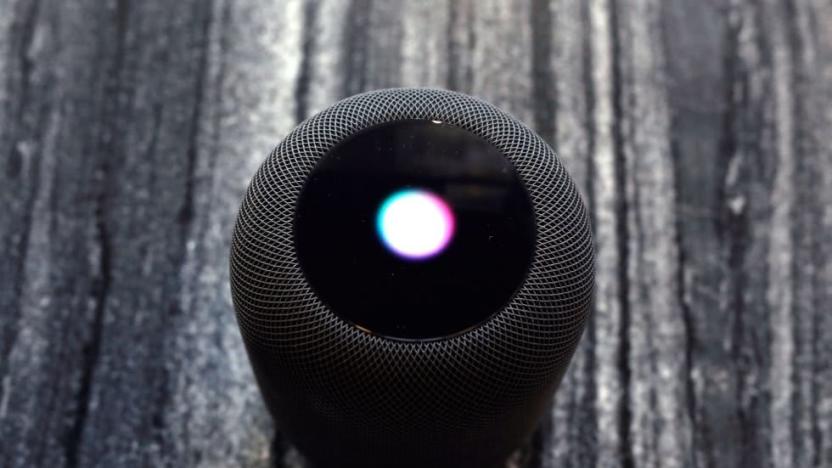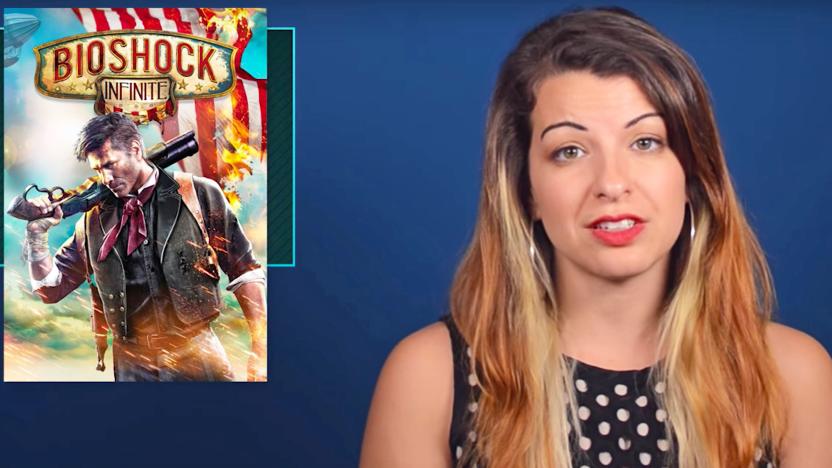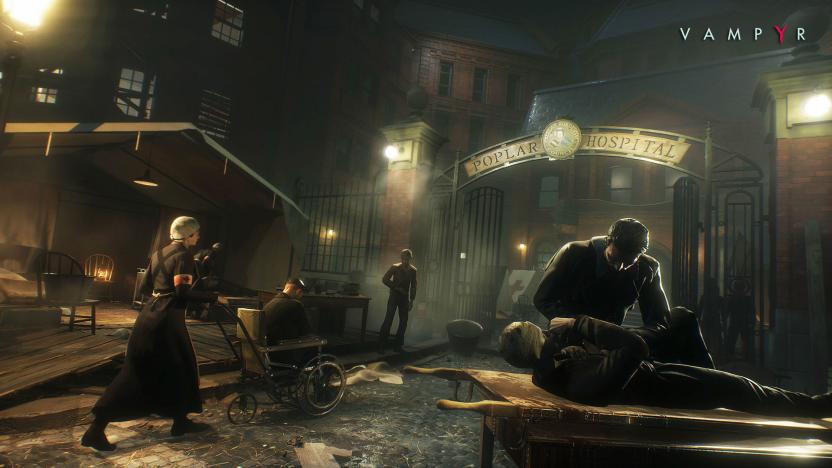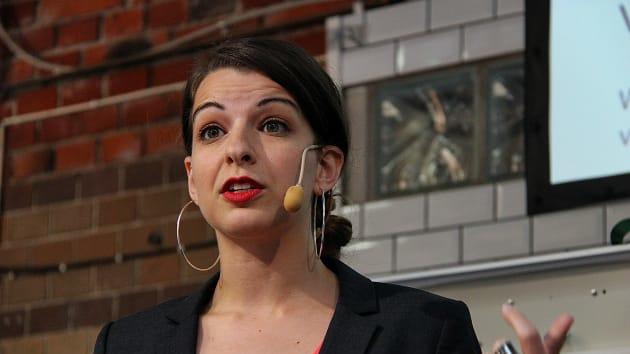feminism
Latest

Apple rewrote Siri to dodge questions about feminism and #MeToo
Siri may be in favor of equality, but just don't call her a feminist. That's the gist of multiple internal Apple documents obtained by The Guardian that instruct employees to program the digital assistant to avoid and deflect questions about "sensitive topics" like feminism and the #MeToo movement. The documents date to June 2018 and were leaked to The Guardian by one of the contractors that worked for Apple's Siri "Grading" program, which the company suspended in August.

'Tropes vs. Women in Video Games' says goodbye
The groundbreaking critical series Tropes vs. Women in Video Games is coming to an official end. "This is one of the most emotionally complicated projects I've ever created," writes creator Anita Sarkeesian in a new note to fans. She's been looking to finish the series for a while now, thanks to the toll it's taken on her both personally and professionally. But, while her latest post touches upon the trauma she experienced from angry gamers, the overall focus of the entry is positive and forward looking.

IMDb adds 'F-Rating' to help users identify feminist-friendly movies
In a bid to highlight movies that celebrate women in cinema, popular film information site IMDb has incorporated a new feminist classification into its listings. In order for a movie to earn the new 'F-Rating', it must either be written or directed by a woman or feature significant female characters on screen in their own right. Created in 2014 by Bath Film Festival director Holly Tarquini, the new classification has since been adopted by over 40 cinemas and film festivals in the UK. Tarquini states that 21,800 films have been awarded the rating on IMDb so far.

Sammus is somewhere between nerdcore and afrofuturism
Enongo Lumumba-Kasongo used to get the same question every time she set down the mic and stepped off the stage. She came to expect it after performing in crowded bars, big music festivals or comic book stores, and the question usually came from a well-meaning stranger or new fan of her music. "Who makes your beats for you?" This would happen right after she'd screamed into the mic that she was Sammus, a producer and rapper, and that everything she just did on stage was her work. The question would come in different forms -- "Where's your boyfriend?" was another staple -- but the sentiment was the same. People assumed Sammus didn't produce her own music.

Gaming's representation problems and where we go from here
Games are now big business and influential media in their own right. So what do video games tell us about how we see ourselves? Anita Sarkeesian from Feminist Frequency joined me on the Engadget CES stage to discuss games as popular culture, where we are now and the challenges facing better representation in the games that we all love. As our guest puts it: "The media works to reinforce and reflect society, for better and worse."

New Feminist Frequency video dissects 'Women are too hard to animate'
After shifting its schedule to release shorter, more rapid entries in its series Tropes vs. Women in Video Games earlier this year, the cultural criticism web channel Feminist Frequency posted its latest episode today. It tackles the excuse game studios have given when they don't include female playable characters: that women are too hard to animate. (Spoiler: they're not.) When one sex is treated differently in games, the video argues, negative and predatory attitudes proliferate.

'Vampyr' and the gender politics of 1918 London
Vampyr, the next game from Dontnod Entertainment features a white, male protagonist. For any other studio, this is de rigueur, something dictated by the gaming industry's presumed demographic. But for the team behind Life is Strange and Remember Me, it's the first time they've delved into the male mindset. And it wasn't the result of market research either: It's because Vampyr's story wouldn't have worked any other way.

New 'Feminist Frequency' video examines 'women as reward'
In 2012, Anita Sarkeesian asked for $6,000 on Kickstarter to create a YouTube series dissecting the way video games commonly portray women, to be housed under her Feminist Frequency brand. Sarkeesian's project raised $160,000 and she's since released eight videos in the Tropes vs. Women in Video Games series, covering the "Damsel in Distress" trend, "Ms. Male Character" theme and the idea of "Women as Background Decoration." The latest video, released today, covers "Women as Reward" and it discusses the myriad ways women are offered as hyper-sexualized trophies in some popular video games.

Security conference effectively bans booth babes from its show floor
The issue of booth babes -- scantily clad people attempting to lure unsuspecting buyers towards second-rate products -- has once again reared its head within the industry. This time out, cryptography and information security gathering RSA has effectively banned them, mandating that all attendees will wear clothing that's appropriate for a professional environment. According to a statement released to TechTarget, people will be unable to display "excessive cleavage," and won't be able to wear tank tops, tube tops, miniskirts or minidresses. RSA go on to say that any scantily dressed people found on the show floor would be asked to put on a sweater or leave.

Latest 'Tropes' video highlights strong female game characters
Earlier this year culture critic Anita Sarkeesian outlined her plan for the coming months, and those included new episodes of her YouTube series Tropes vs. Women in Games. Some would take a different approach, though, including a look at positive depictions of women in interactive media. The first of those videos went live today and it's all about Superbrothers Sword and Sworcery's protagonist, The Scythian. It's a thoughtful look at one of the most stylish games in recent memory, exploring exactly what makes her such a strong character. It's a direct response to the common refrain from her most vocal detractors that all she does is highlight the bad in games, and as per usual it's a pretty great video overall; check it out just below.

Expect two new series from Feminist Frequency in 2015
Controversial games critic and YouTube star Anita Sarkeesian has outlined plans to launch two new web series in 2015, while continuing to produce her popular Feminist Frequency videos. According to the report (.pdf), Sarkeesian's non-profit organization (also named "Feminist Frequency") has plans for two new productions, a "video series examining the representations of men and masculinity in video games" and a "miniseries presenting examples of positive female characters in video games." No further details on either series are mentioned, but the report does state that Sarkeesian and her colleagues will continue their work as vocal advocates for gender equality in virtual culture. These burgeoning plans follow a successful year for Feminist Frequency in which the group attracted over $400,000 in donations and Sarkessian's efforts were featured in media outlets ranging from Joystiq to the New York Times. She even appeared on one of the final episodes of The Colbert Report to discuss her work and her many, many online detractors. [Image: Feminist Frequency]

GamerGate target working with 'major social media' to end online abuse
Along with game developer Zoe Quinn, Anita Sarkeesian is likely one of the most knowledgeable people when it comes to online harassment. Both have been targets of intense cyber-abuse campaigns stemming from the GamerGate movement, and like Quinn, Sarkeesian is tackling the problem head on. She's going to continue giving speeches and making videos examining media (what she calls public efforts), but the digital abuse she's receiving has changed her long-term goal: "There is also work being done behind the scenes in private meetings and consultations with major social media and gaming platforms, and by partnering with other organizations to form a task force with the goal of ending online harassment."

Gaming culture critic Sarkeesian cancels speech after school shooting threats (update)
Following threats of extreme violence at Utah State University, feminist culture-critic Anita Sarkeesian has cancelled her speech at the school scheduled for Wednesday. This morning, someone claiming to be a student at the university emailed staff members, saying that he or she would commit "the deadliest school shooting in American history" if the event wasn't cancelled, according to Utah newspaper The Standard Examiner. The email's author says that feminists have ruined their life and promised a "Montreal Massacre-style attack," stating that he or she possesses a variety of firearms and explosives and that no one in attendance or at the campus' Women's Center would be able to defend themselves should the lecture take place. This isn't the first time Sarkeesian has come under threat, either -- let alone the first time this year.

Flameseeker Chronicles: Guild Wars 2's gender divide
When I sit down to write an installment of this column that is strongly critical of Guild Wars 2 -- a game I love, in case that was ever in doubt -- I try to follow a simple format in order to keep my criticism from turning into a venting session. That format is to establish that there is a problem, explain why it's a problem requiring a solution, and finally to offer any ideas or suggestions I think might be useful to that end. I do this because I want my articles to be helpful on some level to both ArenaNet and other fans, and while blowing off steam is excellent for the bilious humors, it's not so great for creating actual change. Sometimes, though, the only suggestion I can offer is to please stop doing something because the fact that it's a problem is reason enough for it to require that solution. This is especially important when the issue isn't gameplay or monetization but rather something that personally affects me and the people I play with. As a warning, several of the source links in this article lead to discussions of graphic and disturbing language and events.

Mike Morhaime apologizes for lack of diversity in Blizzard games
It's been a bad year or so for women in Blizzard games, for a lot of reasons. At BlizzCon, Warlords of Draenor was described as a "boy's trip" that Aggra wasn't invited to -- which fits with the Warlords marketing material that shows almost exclusively male characters (a few women appear in the trailer and one in the art, but they're unnamed). But Warlords isn't the only concern: the company's April Fool's joke came off as tone-deaf to many, Heroes of the Storm uses female characters as eye candy (which game director Dustin Browder argued didn't send a message), and, recently, Rob Pardo stated in a talk at MIT that diversity wasn't really a value for the company. Though Warlords has come a long way since BlizzCon and both Browder and Pardo apologized, the fact that any of these things were an issue in the first place is off-putting -- at best -- to female gamers. Even long-term Blizzard fans have started to wonder why they're continuing to play in a gaming world that didn't accept women amongst the cast of heroes. It's from this place of disappointment that Starcunning wrote to Mike Morhaime, explaining why she's walked away from Blizzard's games. The surprise, however, is that Mike Morhaime responded stressing Blizzard's commitment to listening to the playerbase and building games that are fun for everyone. Mike Morhaime We are very conscious of the issues you raise and are discussing them more than ever, at every level of the company, in an effort to make sure our games and stories are as epic and inclusive as possible. Blizzard's employees form a broad and diverse group that cares deeply about the experiences we are creating for our players. And we know that actions speak louder than words, so we are challenging ourselves to draw from more diverse voices within and outside of the company and create more diverse heroes and content. We are also actively looking at our story development and other processes to ensure that our values are fully represented. We've always believed that positive, lasting change comes from examination, discussion, and iteration, and this applies as much to story as to gameplay. There is no reason why inclusivity should come at the expense of an amazing game experience. source

Hearthstone tournament now open to all
Yesterday we reported about the oddity of a Hearthstone tournament that didn't allow women to compete. The reason? The International e-Sports Federation wanted gaming to be recognized as a "true sport," and was following the professional sports model of gender division. With fewer women competitors than men, this led to tournaments with a large selection of gaming events for men, but few for women -- in the case of this tournament, Hearthstone, Dota 2, and Ultra Street Fighter IV were all men-only events. While e-Sports are often gender-divided (competitive StarCraft is notable in this regard), the idea of a men-only Hearthstone tournament was apparently the straw that broke the camel's back. Among many others, Blizzard spoke out against IeSF policy, telling VentureBeat, "One of our goals with e-sports is to ensure that there's a vibrant and also inclusive community around our games. We do not allow the use of our games in tournaments that do not support this, and are working with our partners to ensure they share the same goal." The end result is that the IeSF has reversed the policy, and offers events open to all genders as well as women-only events to encourage the participation of women in the male-dominated field of pro gaming. It's a setup that's similar to the competitive chess scene, which has both a World Chess Championship in which anyone can compete and a Women's World Chess Championship. Now, at the 6th e-Sports World Championship BAKU 2014, men and women will be able to compete together in StarCraft 2 and Hearthstone tournaments, while there's also a women's only StarCraft 2 tournament. Time to get your game on!

Hearthstone tournament bans female competitors
No girls are allowed to compete in Finland's Assembly Summer 2014 Dota 2, Ultra Street Fighter IV, and Hearthstone tournaments, which are open to men only. According to the International e-Sports Federation's rules, the genders of competitors in e-sports are separated to help the competition be recognized as a "true sport." In response to complaints, the IeSF posted the following on their Facebook page: "The decision to divide male and female competitions was made in accordance with international sports authorities, as part of our effort to promote e-Sports as a legitimate sports." And while this means separate but equal style treatment for some events, for others -- like Hearthstone -- it means women simply can't compete at all. At Assembly Summer 2014, women aren't allowed into these tournaments because if they won, they wouldn't be allowed into the IeSF men-only world finals. Markus Koskivirta, head admin of the Assembly Summer 2014 Hearthstone IeSF Qualifier, speaking to PC Gamer, said that the Finnish eSports Federation is lobbying for equal rights for male and female gamers... but with the long and strange tradition of segregated e-sports (StarCraft competition often has such divisions), that could be a long time coming. Though the IeSF says it wants to promote female gamers by hosting women's only events, the end result of this is to keep women on the outskirts of pro gaming by relegating their participation to smaller events and smaller stages. All this goes towards suggesting that women aren't good enough to compete with the men -- something that in an all-digital "sport" is difficult, at best, to justify. We all love the same games, so why can't we play them together?

New 'Tropes vs. Women' discusses the dark side of decoration
Feminist Frequency founder Anita Sarkeesian has launched the first video in her "Women as Background Decoration" series, dissecting how women are portrayed as non-playable sex objects in video games and the real-world effects these images have on players. Women as Background Decoration is the second series in Sarkeesian's Tropes vs. Women video campaign, which raised $158,922 on Kickstarter in 2012. In part one, Sarkeesian breaks down how women are hyper-sexualized and transformed into objects in many games, allowing players to use, abuse and dispose of female sex workers as if they were things, rather than people. She covers series such as Grand Theft Auto, Fable, Fallout, Sleeping Dogs, Watch Dogs, Hitman, Red Dead Redemption, Duke Nukem, Dishonored and The Godfather. "These games systematize sexuality in ways that dehumanize women, essentially turning them into vending machines dispensing sex, along with other goods and services. Their worth as characters is measured entirely in terms of what they can give to the player .... When men are depicted using female NPCs as tools or commodities, their actions are portrayed as part of what makes them powerful, which is by extension part of what makes the player then feel powerful."

Damsel in Distress: Part 3 of Tropes series discusses 'dude in distress'
The third installment of Anita Sarkeesian's Damsel in Distress video series explores the "dude in distress" mechanic, the use of ironic sexism in retro-inspired games and wraps up with a look at games that subvert the damsel in distress idea. Sarkeesian notes that games featuring female heroes saving male counterparts – the dude in distress – are rare, with only 4 percent of games placing a woman in a leading role. Even then, the damsel in distress trope perpetuates a longstanding notion that women are inherently helpless and need saving, but the few dudes in distress don't negatively impact society's view of men, since there is no preconceived belief that men are powerless to save themselves because of their gender, she says. This is the final Damsel in Distress video, and the first completed video mini-series in Sarkeesian's Tropes Vs. Women in Video Games project. Tropes was funded via Kickstarter, raising $159,000 of a $6,000 goal, and expanding the series to 12 videos. Next up, according to the Kickstarter, is a section called "The Fighting F#@k Toy." Sarkeesian prefaces each of her videos with the same guiding principle: "It is both possible (and even necessary) to simultaneously enjoy media while also being critical of its more problematic or pernicious aspects." Note that it doesn't say, "while also violently cussing out people who disagree with your views." Please, enjoy your critical analyses.

The Soapbox: Yes, Virginia, sexism still exists
About two years ago (two decades in internet years), I wrote a piece about sexism as it pertains to MMOs. I didn't write anything about it for a long while afterward because I would just be reiterating points that were stated in the first article, something I'm not fond of doing. But when I wrote another article praising a game for mostly getting equality right, well... I'm not fond of rehashing old points. But I'm also not fond of the idea that people have evolved from saying "it's not sexist" to "oh, there's no sexism here in the first place." As I said two years ago, there's a lot that MMOs get right that gaming in general still gets wrong. But there's also a lot that MMOs get wrong still. So I want to look at the issue, look at some of the common attempts to pretend it's not really an issue, and possibly provide some links of relevant interest. There are a lot of those.










